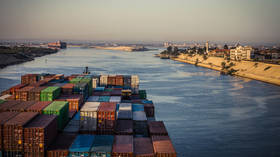Putin suggests alternative route to deliver goods to Africa
The Russian president has proposed setting up a logistics hub for the North-South Corridor on the coast of the continent
The International North-South Transport Corridor (INSTC) could provide Russian goods with a shorter route to Africa than the Suez Canal, President Vladimir Putin said on Thursday.
Addressing a plenary session of the Russia-Africa summit in St. Petersburg, Putin explained that Moscow is “actively engaged in reorienting transport and cargo flows towards the states of the Global South, including, of course, Africa.”
The INSTC, touted as an alternative to the Suez Canal, is a planned 7,200km multi-mode transit system that will connect ship, rail, and road routes for moving cargo between Russia, Iran, Azerbaijan, India, and Central Asia.
“The International North-South Transport Corridor that we are developing is aimed at providing Russian goods with access to the Persian Gulf and the Indian Ocean, from where they will be able to reach the African continent via the shortest sea route. Naturally, this corridor can also be used in the opposite direction – to supply African goods to the Russian market,” Putin stated.
Russia is seeking to ensure interconnectivity within the route and launch regular freight shipping lines, according to Putin. The volume of goods shipped via the INSTC is expected to almost triple over the next seven years, and the Russian leader suggested establishing a logistics hub for the corridor on the African coast.
“The opening of a Russian transport and logistics center in one of the ports on the African coast would be a good thing, a good start to this joint work. We consider it important to ensure wider coverage of the African continent with direct flights [and] participation in the development of the African railroad network – these are the key tasks that we propose to our African friends to work together on,” Putin said.
Russia has repeatedly said that the INSTC could become a substitute for the Suez Canal, the 193km waterway in Egypt that connects the Mediterranean Sea to the Red Sea. The popular route between Europe and Asia sees about 12% of global trade pass through it each day.
The construction of the INSTC began in the early 2000s, but developing it further has taken on a new impetus in light of Western sanctions, which have forced Russia to shift its trade flows from Europe to Asia and the Middle East.
The total cargo flow along the INSTC was 14.5 million tons in 2022, and the projection for this year is 17.6 million tons, according to Russia’s Transport Ministry. By 2030, the volume is expected to reach 41 million tons.
For more stories on economy & finance visit RT’s business section
You can share this story on social media:








Comments are closed.